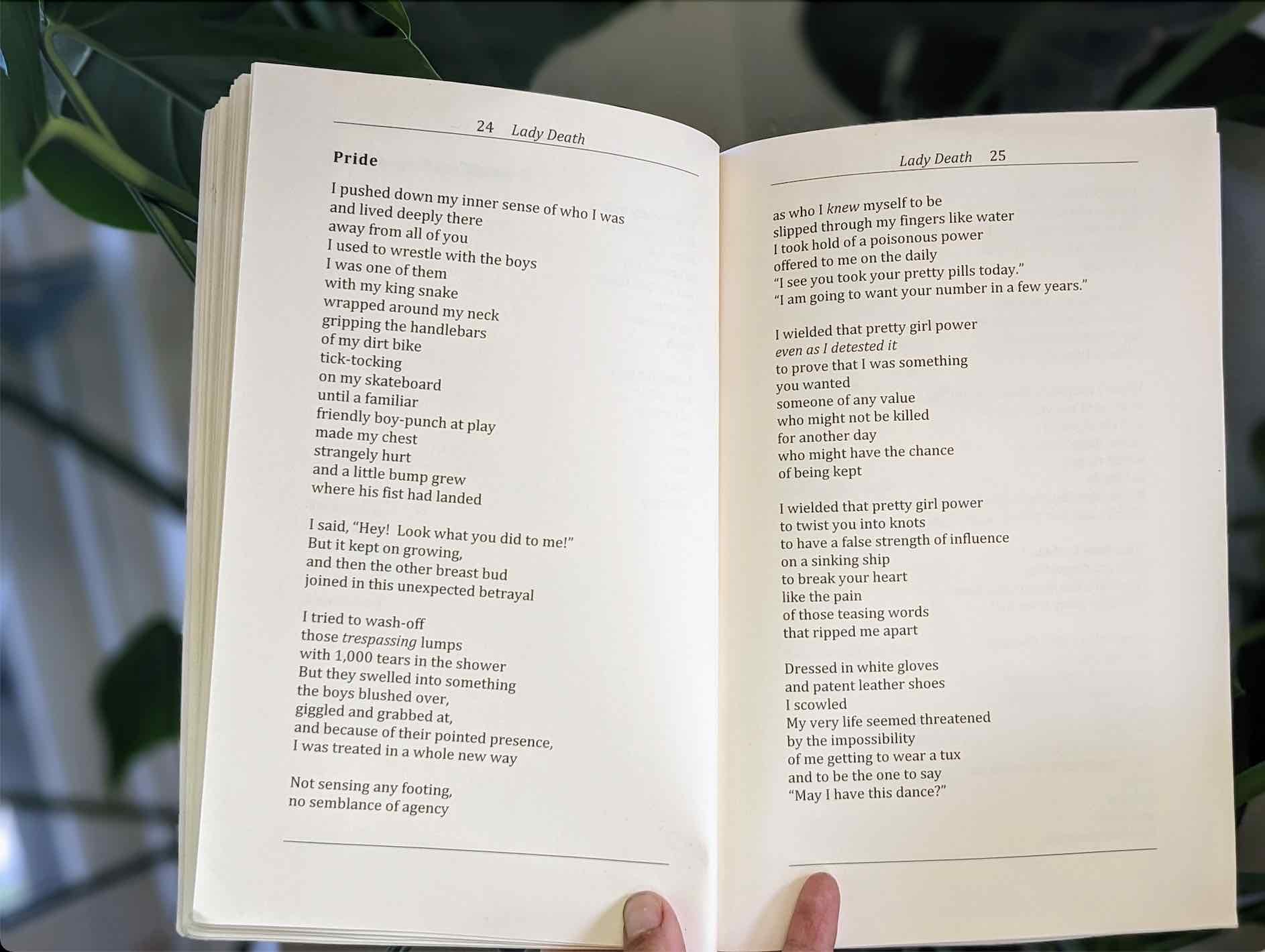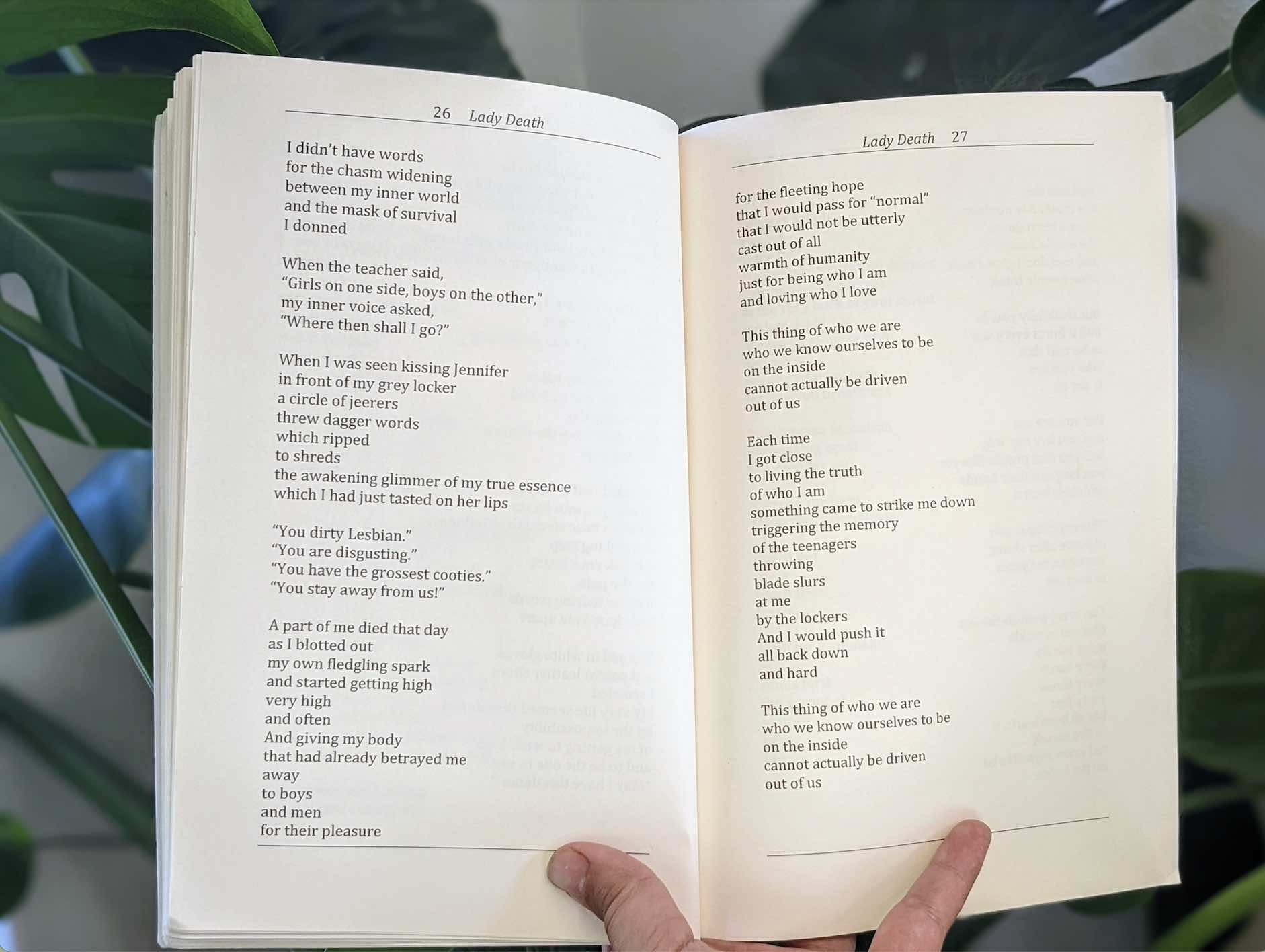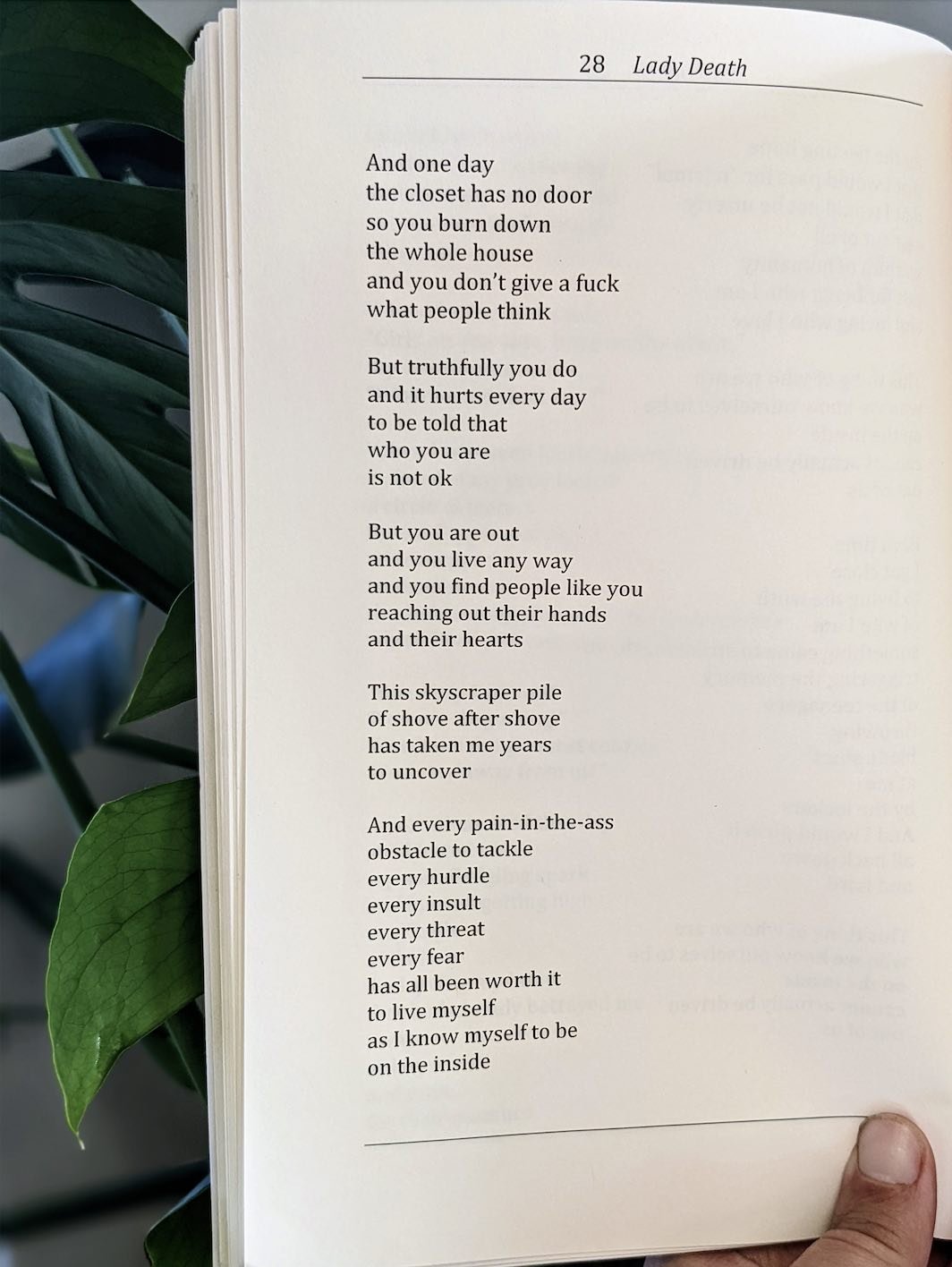Five Must Read Poems for Trans Day of Visibility
Being Trans is Beautiful a poem by Keath Silva. Photo Credit: Cole Goodwin
By Cole Goodwin
Happy Transgender Day of Visibility!
This trans day of visibility, we sat down with transgender poet, Keath Silva from Hood River, Oregon to talk about five poems from his latest book of poetry, Lady Death, and other poems venerating change.
Keath’s moving and down-to-earth collection of poems is a window into the transgender experiences and can be a companion to anyone who may be on a journey of coping with loss, letting go of falsity and embracing authenticity.
Thank You My Allies by Keath Silva. Photo Credit: Cole Goodwin
1. Thank You My Allies
Keath’s poem Thank You My Allies, invites readers to consider the well-being they can promote in the world by using trans people’s pronouns.
“When you call me by the name and pronouns I adore, you give me wellness, welcome and home Thank You” reads the poem.
“It’s written to invite cis people to do a little work and make using the pronouns people ask you to use a priority,” said Keath. “You can make someone's day. You can save people’s lives.”
Misgendered a poem by Keath Silva. Photo Credit: Cole Goodwin
2. Misgendered
Keath’s poem Misgendered, shares what it can feel like when people use the wrong pronouns for a trans person.
In that poem Keath wrote, “I liken how I feel when you call me lady or ma’am to being a balloon that has been suddenly popped, an unexpected slap in the face”.
“I’m not someone who’s easily offended,” said Keath. “But in this poem I had to really stay with myself and be real about how different it feels when someone uses the correct or incorrect pronouns for me.”
“If someone says “Sir” to me, I get a burst of energy and feel like I can do anything. And if someone says Ma’am to me, it’s like I never want to leave my house again; I don’t want to be a part of the human race. I don’t want any of it.”
“Those feelings are just so intense for me. And I know I’m not the only one with that experience, and I invite people to start efforting to make someone's day by using the pronouns they adore or just use gender neutral language if you’re not sure.”
“Part of what I love about shopping, dining and going places in LA is that most everywhere I go they say “Hello Friend!” I’ll happily go out and about there. But not here in Hood River… Even going to the Post Office or grocery store is exhausting to me because I have to be like, okay how do I have to present myself so that they are going to say Sir to me, and I brace myself and get ready because I am surely going to be stared at and misgendered. It’s exhausting.”
“My hope in writing that poem was that folks could learn what that feels like because you don’t know what you don’t know. So, let’s talk about it! We have to talk about it and share our experiences.”
Keath wanted to add that it’s not just the pronoun that’s the issue.
“And it’s not just about the pronoun; it’s about the weight behind it. In 2021, 375 trans people were violently murdered. And that’s the weight that being misgendered carries.” said Keath.
“And that’s what I think about when people are looking at me weird or when they just aren’t getting it. Most people are totally benign and don’t mean any harm. But there is a safety issue there.”
At the end of the poem Misgendered Keath wrote “Allowing Lady Death into my life is the freedom of allowing the word “lady” and all the torture wrapped up in it to die making space for the sound of who I am to fly”
“Everything crumbled. The whole world that I had built based on a false persona was crumbling. But I found my own company. I found a well of compassion, peace and company within my soul and that’s a great fortification against anything. I spent so much of my life running from who I am because everytime I showed it, it was like a punch in the face.”
“So allowing Lady Death into my life allowed me to befriend myself. And I felt a lot of pain but I held myself through that and it was strengthening.”



3. Pride.
Pride charts Keath’s journey as an adolescent who knew he was a boy, but learned overtime to wield “pretty girl power” to gain some sense of personal agency to a teenager who was bullied for being a lesbian, to an adult who eventually comes out as queer and trans.
It tells the quintessential queer tale of overcoming both external obstacles of shame and ridicule and internalized oppressions so that they can live as the person they know themselves to be.
In that poem Keath wrote “Each time I got close to living the truth of who I am, something came to strike me down” and alluded to those moments when he was struck down as piling up inside of you until they reached skyscraper heights.
However the poem is triumphant in its declaration that “who we know ourselves to be on the inside cannot actually be driven out of us” and he states that the pain he experienced “has all been worth it to live myself as I know myself to be, on the inside.”
Keath shared his tips for having Pride in who you are.
“You’ve got to do whatever you can do to get to know yourself and advocate for yourself,” said Keath. “And love yourself, as trite as that sounds. Until you have that relationship with yourself, on the inside, no amount of support from the outside is ever going to make a lasting difference. Even though this deep inner work is necessary for true healing, being in healthy and supportive trans and queer community can give you the strength to look within."
“There’s as many genders, gender expressions, and sexual orientations as there are people. So, even in coming out, don't worry about what someone else's version of coming out looks like. Don’t worry about being trans enough or nonbinary enough. You are enough just as you are.”
“I’m a trans man who doesn’t want to have top surgery. I want to have long hair. Sometimes I want to dress in something that might be called feminine. You can be who you are. You don’t have to meet anyone else's expectations.”
“And reach out to supportive LGBTQ+ spaces. Find communities where you can share your experiences and be validated. This healing is done in the community.”
“Black, indigenous, people of color, trans and gender expansive voices such as Alok Vaid Menon and Neverending Nina are an incredible gift of wisdom and resilience! Listen, learn and support! Connecting with trans and gender expansive folx who have walked the road before you is so helpful. Look to folx who have already done this work of knowing themselves and being a source of love for themselves, and they can inspire you in your journey.”
A Message for Trans Kids a poem by Keath Silva. Photo Credit: Cole Goodwin
4. A Message for Trans Kids.
The poem encourages kids to look to their queer elders and their community as allies on thier path and invites them to “tend the flame of who you are in your wild creative hearts.”
Keath shared what he felt are some of the biggest challenges facing trans youth today.
“Just being a trans youth is a huge challenge.” said Keath.
“I think the biggest challenge for trans youth is often just getting through the day and staying alive. Then, it’s coming to terms with the 375 trans murders last year, and politicians writing laws to stop your thriving and countless people misgendering you, unsupportive school environments and in some cases, having parents, caregivers and family members that don’t accept your transition.”
“I read a Forbes article on the staggering trans youth suicide rates and the main sentiment transgender youth expressed was summarized as: "It is better to be dead than to be trying to live with rejection, isolation, lonliness, bullying, and being targetted by politicians trying to push through anti-trans legislation,” said Keath.
“According to the Trevor Project, 42% of all trans and nonbinary youth in the U.S. condisidered killing themselves in 2020.”
“There are three easy things you can do to help support youth and lower trans youth suicide rates.
Use their pronouns. If someone says, my pronouns are he/him. Then call him he/him; that can help him get through the day.
When trans youth are able to change their name and gender marker on their ID that helps a lot. That keeps kids alive and here. So push for that.
Being in trans-supportive communities such as LGBTQ clubs in their schools and trans support groups is vital. I mean come on, let’s even go big and start having establishments and community spaces where trans youth can walk in and hear “hello friends” instead of gender specific language. Also setting up safe trans inclusive bathrooms is vital.
“Those three things are the recipe to keep trans kids alive. It’s not hard. We just have to do a little bit, all the time,” Keath said.
Let Fall to the Ground, a poem by Keath Silva.
5. Let Fall to the Ground.
This poem was CCC News LGBTQ+ reporter Cole Goodwin’s favorite poem from Keath’s book.
“I feel that this poem was just so important to me as a queer person, and I’m not even sure how to explain why it is important to me,” Cole said. “The imagery you use is just so full of visual and sensual cues that describe the way a heart can feel when it’s just beginning to find it’s queer identity and it’s queer community.”
“Keath, can you tell me a little about your writing process and your use of nature and an herbalist perspective to ground abstract human concepts in the very physical natural world?”
“Ever since I was little I didn’t feel like I fit in anywhere,” said Keath. “So, I would play in the trees and cry to the trees and stuff. So, that’s just where I go for support. Nature is always there for me.”
“That poem was also a result of my engagement with the work of neuroscience educator Sara Peyton,” said Keath. “In neuroscience, they’ve discovered that if somebody can express, describe, and name what they are feeling in metaphor, or someone mirrors that to them (which is called resonance) that feeling is no longer stored in the brain as trauma.”
“And it helps you process and heal. So, that’s what I was doing for myself in that poem.”
“And that could be why I experienced so much resonance with it as well,” said Cole. “I didn’t have the language to express what it felt like as a queer person in discovering my identity and my community. But your poem gave it words by using metaphor.”
“So much of being a human lives in the space of imagery and dreams. That’s where the juice is. It’s not just all in our logical brain. It doesn’t work like that. We’re multi-dimensional beings.”
Tune into a LIVE transgender poetry reading at 6pm on March 31st for Trans Day of Visibility with Cole Goodwin and Keath Silva on Instagram Live at @transmanpoet.
About Keath Silva
Keath Silva is a transgender herbalist, bodyworker, medium, writer and Hood River resident who is in the process of relocating to Los Angeles, CA in 2023. His new book Lady Death is on sale now at Moon Mountain Highway in Bingen, Washington or Revolution Bookshop in Portland, Oregon or online at BookBaby.com. Learn more visit Keath’s website.
Author Keath Silva, wearing a shirt designed by trans activist and artist Mars Wright that reads strong men cry, holds up an autographed copy of his “book baby” at Waucoma Bookstore in Hood River, OR. Photo Credit: Jenny Cohen
This article was written by a transgender journalist.
Cole Goodwin, is a genderfluid and gender expansive nonbinary journalist working to bring honest inclusive LGBTQ+ representation to rural media in the Mid-Columbia region of Oregon and Washington.
Enjoying this content?
Read CCCNews interview with Keath about his new book.
Support honest, inclusive, LGBTQ+ representation and the empowerment of a rural LGBTQ+ journalist by supporting Columbia Community Connection News.

